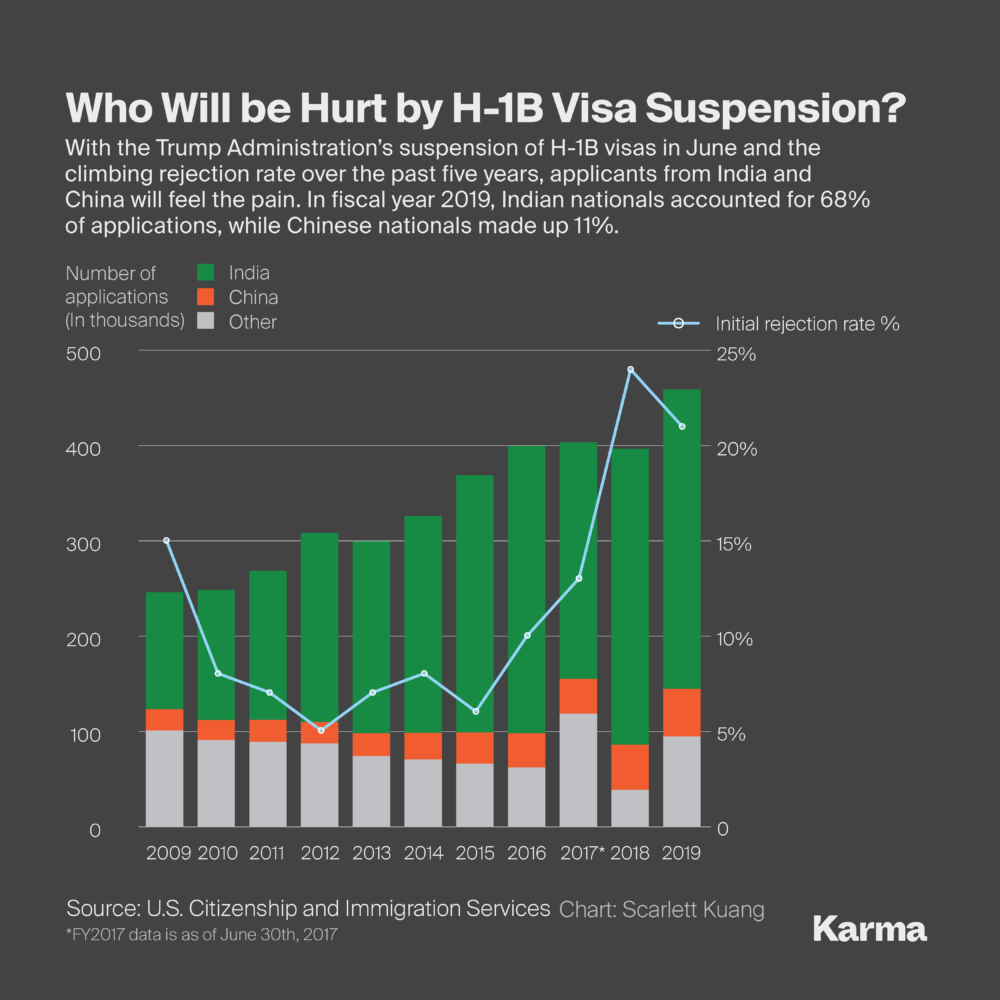- The H-1B visa ban may U.S. tech its top spot in the world
- H-1B workers in U.S. may feel compelled to go back to home countries, making those places more competitive
- India, the No. 1 origination country of H-1B visa holders, may benefit by keeping workers who otherwise would leave for the U.S.
President Trump says his recent ban on H-1B and other visas is aimed at protecting U.S. workers who lost their jobs due to the coronavirus pandemic. That protection may cost the country its top spot for tech innovation.
Amazon, Google, Microsoft and Facebook are among the top 10 employers of H-1B visa holders, and the ban may keep them from attracting the world’s best tech talent. Moreover, Trump’s proclamation leaves open the possibility that visa holders already in the U.S. may be forced to leave, according to the National Foundation for American Policy.
“Hundred of thousands of hardworking immigrants may have to go back to their country,” Rohit Mittal, CEO and co-founder of fintech lender Stilt Inc., told Karma. “This is actually a negative for the U.S.” because these immigrants help make the U.S. “the most concentrated talent pool in the world.”
Concerns that the U.S. edge in technology will be hurt by the H-1B ban rest on the fact that the tech industry relies heavily on the program. About two-thirds of the H-1B petitions approved last year went to positions in the tech industry, U.S. figures indicate. Seven of 10 immigrants under H-1B last year were from India, making the country the No. 1 participant in the country.

Mittal said an extended H-1B ban will prevent the U.S. from landing some of the top talent from other countries. “Over time, the asymmetric advantage the U.S. has now will go away,” he said.
“Having a process to bring the best talent from around the world here is crucial,” Mittal said. “The goal should be something that will make the top-tier talent more inclined to come here.”
Stilt has provided “many thousands of people with tens of millions of dollars” in loans since 2016. H-1B visa holders and other immigrants from more than 150 countries have used the company’s unsecured personal loans as a bridge while waiting to gain access to the U.S. financial system.
Stilt has raised $7.5 million in equity and $100 million in debt equity, which is used to finance the loans, Mittal said. The startup is not in a fundraising round right now.
His customers don’t just bring their knowledge when they arrive in the U.S., they also bring different perspectives. People from Africa, Latin America and Asia can contribute through their varied experience, enhancing tech innovation, said Mittal, adding that the H-1B ban doesn’t take such long-term thinking into account.
New immigrants would pose a “significant threat to employment opportunities for Americans affected by the extraordinary economic disruptions caused by the COVID-19 outbreak,” Trump’s June 22 proclamation said. That threat may be particularly acute for Americans interested in going into STEM (science, technology, engineering and math) fields, according to an Institute for the Study of Labor research paper published in 2016.
Because of the 1990 immigration act that expanded the H-1B program, black males were substantially pushed out of STEM degrees; white males were less likely to be employed in STEM occupations later in their careers; and white female STEM graduates were less likely to be employed, according to the study.
“There are 4 Americans unemployed for every job,” U.S. Rep. Paul Gosar (R-Arizona) tweeted. “Suspend all immigration now until everyone has a job.”
The restrictions certainly may help other countries that try to keep their local talent from going abroad.
Hemant Mohapatra, a partner at venture capital firm Lightspeed India Partners, tweeted that he has heard from “friends @ cos like Google” about returning to India because they are tired of the uncertainty of their status in the U.S.
“Ban was a personal betrayal,” Mohapatra tweeted. “Indian startups pay well (some roles are at bay area salaries) and do VERY exciting work. COME HOME AND BUILD!”
Stilt has raised $100 million in debt equity. An earlier version of story incorrectly said $100.






















